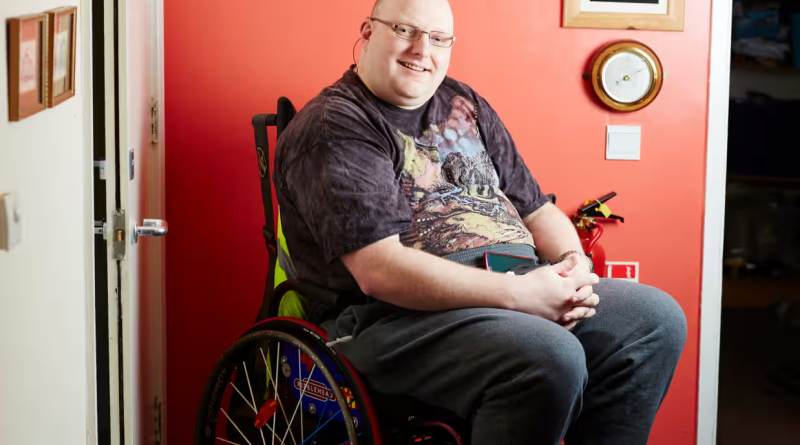UK government faces claim over alleged failure to protect people in climate crisis

Photograph: Doug Paulley, pictured at home in West Yorkshire, called for ‘a new adaptation programme that recognises the acute threat disabled people face’. credit: Christopher Thomond/The Guardian
In December, council officials ordered Kevin Jordan to leave his home, warning him it was at risk of falling into the sea at any moment.
On Tuesday, he had his day in court, accusing the government of failing to do enough to adapt to the changes the UK is facing as a result of climate breakdown.
Jordan is one of three claimants bringing a legal challenge over what they describe as the government’s failure to protect people, property and infrastructure from the foreseeable impacts of the accelerating climate crisis.
They argue the government has breached the Climate Change Act 2008 by failing to set out clear and realistic objectives in its third national adaptation programme (NAP3), which is supposed to protect citizens from the risks posed by high temperatures, coastal flooding and extreme weather caused by climate breakdown.
Sitting in the back row of court 73 at the Royal Courts of Justice, Jordan, a white-haired pensioner, said he was “nervous, anxious”. Beside him, using a wheelchair equipped with a whirring fan, sat fellow claimant Doug Paulley, who has health conditions that are exacerbated by high summer temperatures.
A key part of their case is that each has suffered harm as a result of climate breakdown. Jordan lost his home, and Paulley’s disabilities mean he is particularly vulnerable during summer heatwaves.
Between them, they allege that NAP3 is so deficient that it breaches their human rights to life, home and possessions, and that they have been discriminated against on account of their vulnerable situations.
The case has been brought with the environmental campaign group Friends of the Earth as the third claimant.
David Wolfe KC, acting for the claimants, said: “The claimants illustrate the situation that other people will be in, importantly.
“Not huge numbers of other people, this is not like the Swiss women who were, in effect, representing all elderly women. These are relatively small but nonetheless large groups of people.”
Wolfe argued in court filings that ministers had to set outcomes to address specific risks, rather than “a generic aim simply to reduce risks”.
Mark Westmoreland Smith KC, acting for the government, said the environmental group’s arguments misunderstood what ministers must do and are essentially a challenge to how the government approached its duties under climate legislation.
“The nature, ambition and framing of the objectives within the programme are matters for the judgment of the [minister], who is politically accountable for them,” he said in court documents.
Throughout the proceedings, Jordan sat with his eyes closed. “I’ve never been here before,” he said before the hearing began. “I don’t know what the procedure is going to be like. I’ve heard it’s going to be pretty boring, basically barristers slugging it out. I look on with interest, but with hope of a victory. I just want the government to go back and rewrite the national adaptation plan.”
Paulley said: “The lack of planning makes me fearful that in an emergency, disabled people won’t be properly protected. We urgently need a new adaptation programme that recognises the acute threat disabled people face.”





